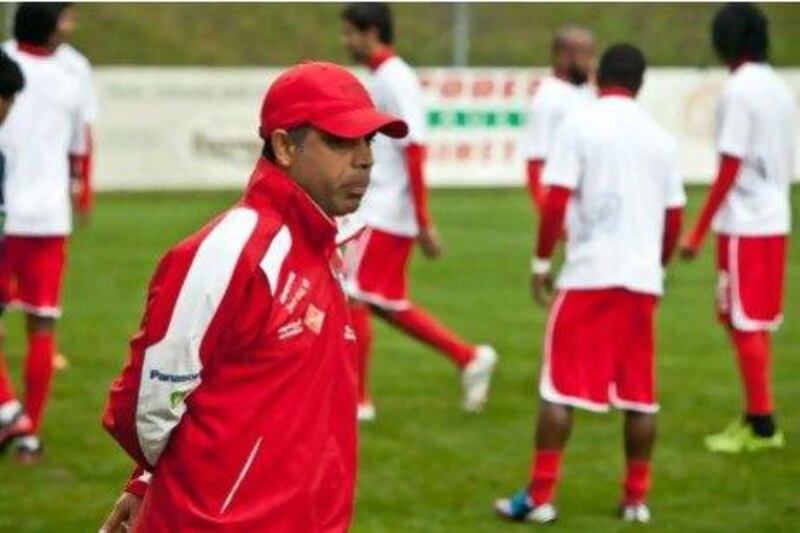It lasted 36 days and 36 nights, this exercise in team building.
It began in Dubai on June 14 and ended in Austria on July 19, and included two travel days, two off days, seven friendlies and 25 days of training.
During those five-plus weeks, 23 young Emirati men shared rooms, took their meals together, prayed in hotels, repeatedly pushed themselves to exhaustion, and endured the UAE heat before adapting to the chill and wet of the Alps.
What was left at the end was something hard and sharp, like iron hammered to remove impurities, a team steeled to face the challenges - but also to embrace the opportunities - of the 2012 London Olympic football tournament.
The marathon training camp ended on Thursday night in a 4-2 victory over a New Zealand team boasting five 2010 World Cup veterans.
Friday, the Emiratis moved to Munich ahead of Saturday's flight to Manchester, site of their first game in Group A play, versus Uruguay at Old Trafford on Thursday.
Ahead, glory, or a desperate attempt at it. What now can be seen, after this period planned by the coach Mahdi Ali and the Football Association's technical committee, is a team as good as it can be.
The core of the group remains the Under 23 side which has gone from success to success since they first assembled for age-group competition some seven years ago. For the Olympics, they have incorporated, with minimal friction, three overage players, including Ismail Matar, winner of the Gold Ball at the 2003 World Youth Championship.
What to make of this group as they to England?
The first impression left, after watching these young men play, is their speed and technical skills. Everyone can run, everyone can handle the ball, and several can make it sing and dance.
The second impression is the lack of size in the squad.
It is not just the whippet-lean look of superbly fit young men; this is a team in which several of the most influential players are short in stature, even by modern football standards.
The uptake, of those technical skills in diminutive frames, is to acknowledge the importance of refereeing at London 2012. If bigger men are allowed to barge into and knock smaller men off the ball, the UAE will face an uphill struggle. If their matches are refereed tightly, and a minimum of contact is allowed, they will be much-better prepared to shock someone in England.
A month ago, one might have said the strength of this team was in defence. That, indeed, has been the hallmark of this generation of players. The preferred back four of Hamdan Al Kamali, Mohammed Ahmed, Abdulaziz Sanquor and Abdulaziz Hussein is a solid group, and the addition of Ali Kasheif, as goalkeeper, is a plus.
But from recent results, it is tempting to say that the best part of the side is now in midfield.
Amer Abdulrahman and Omar Abdulrahman are playmakers of sublime skills. They can hold the ball, distribute it incisively and do so with flair.
Also, the rise of Khalid Essa as a scoring threat on the right side, or the inclusion of Ismail Al Hammadi, the tireless Al Ahli veteran, together with the formidable Khamis Esmail, who can join the attack almost unseen from his deep holding position, make for a formidable and flexible group.
The biggest question surrounding this team, as always, is in the leading edge of the attack. In the past, Ahmed Khalil has scored when the need is most acute, as those who saw his two goals in the London-clinching victory at Uzbekistan can attest.
But he is not likely to beat a defender or two on the dribble, or carry the ball any great distance, leaving the responsibility on his lines of supply to make him dangerous. Khalil likely will be paired with Matar, and he will be needed to help get the ball to the younger man in dangerous positions.
The UAE camp was an extremely long one, especially when compared to that of fellow Group A teams Uruguay, who will play only one friendly ahead of London, and Team Great Britain, who will play only two.
Mahdi Ali, however, wanted to develop a team as tightly knit as possible, and to test out a variety of combinations on the pitch. This he has done. Yousuf Al Serkal, the FA president, a few days ago said: "We are very happy with the team preparation so far. It could not be better."
That is the nub of the issue. Everything that could be done has been done. The Olympics are the biggest competition for the UAE since the 1990 World Cup, and they prepared accordingly.
[ poberjuerge@thenational.ae ]
Follow us
[ @SprtNationalUAE ]





